Did you know that being short on sleep can have a major effect on a person’s weight loss attempts?
The good news is though, that there are so many things we can do to help with improving sleep.
First, let’s look at some of reasons why sleep is an important part of any weight loss journey.
- Hunger Hormones: chronic lack of sleep increases the body’s production of ghrelin (a hormone that increases appetite), and decreases production of leptin (a hormone that signals the body to stop eating). This means that when the body has had a poor sleep, these hormones tell the body that it is time to eat, and that it is not full. This disturbance in signals makes it very easy to overeat.
- Metabolism: chronic lack of sleep has been shown to affect our metabolism. This means the body may potentially burn less energy and store more fat as a result of not sleeping long enough or having poor quality sleep.
- Poor decision making: lack of sleep can decrease the ability to make sound decisions, particularly when it comes to choosing food. It’s not only the late-night snacking that can increase, but studies show that people who are sleep deprived also crave energy dense, high-carbohydrate snacks.
So what can we do to ensure a better night’s sleep?
Here are three practical tips to help you improve your sleep, and to wake up feeling rested and rejuvenated.
- Body temperature: research shows that it is easier to get to sleep on a decreasing body temperature. Some activities, such as exercise and eating will increase your body temperature. Therefore, leaving a gap between your last exercise session or meal and going to bed, may make it easier to get to sleep and stay asleep.
- Caffeine: did you know it can take more than 5 hours for the caffeine in 1 cup of coffee (around 100mg) to reduce to just half (50mg)? Avoid having caffeine later in the day as even 50mg in your system can make it hard to get to sleep.
- Light: exposure to bright lighting in the evening can disrupt the production of melatonin; our sleep hormone that makes us feel drowsy. This includes light from a laptop or phone. If sleep is an issue for you, turn of the computer early in the evening and avoid checking your phone before going to bed.
Similar to nutrition, most of our sleep habits have been ingrained in us for a long time. Changing these habits can be difficult, and a focus on progressively improving them will be more beneficial than changing everything all at once. Check out our article on the power of changing a habit for more info on this.

